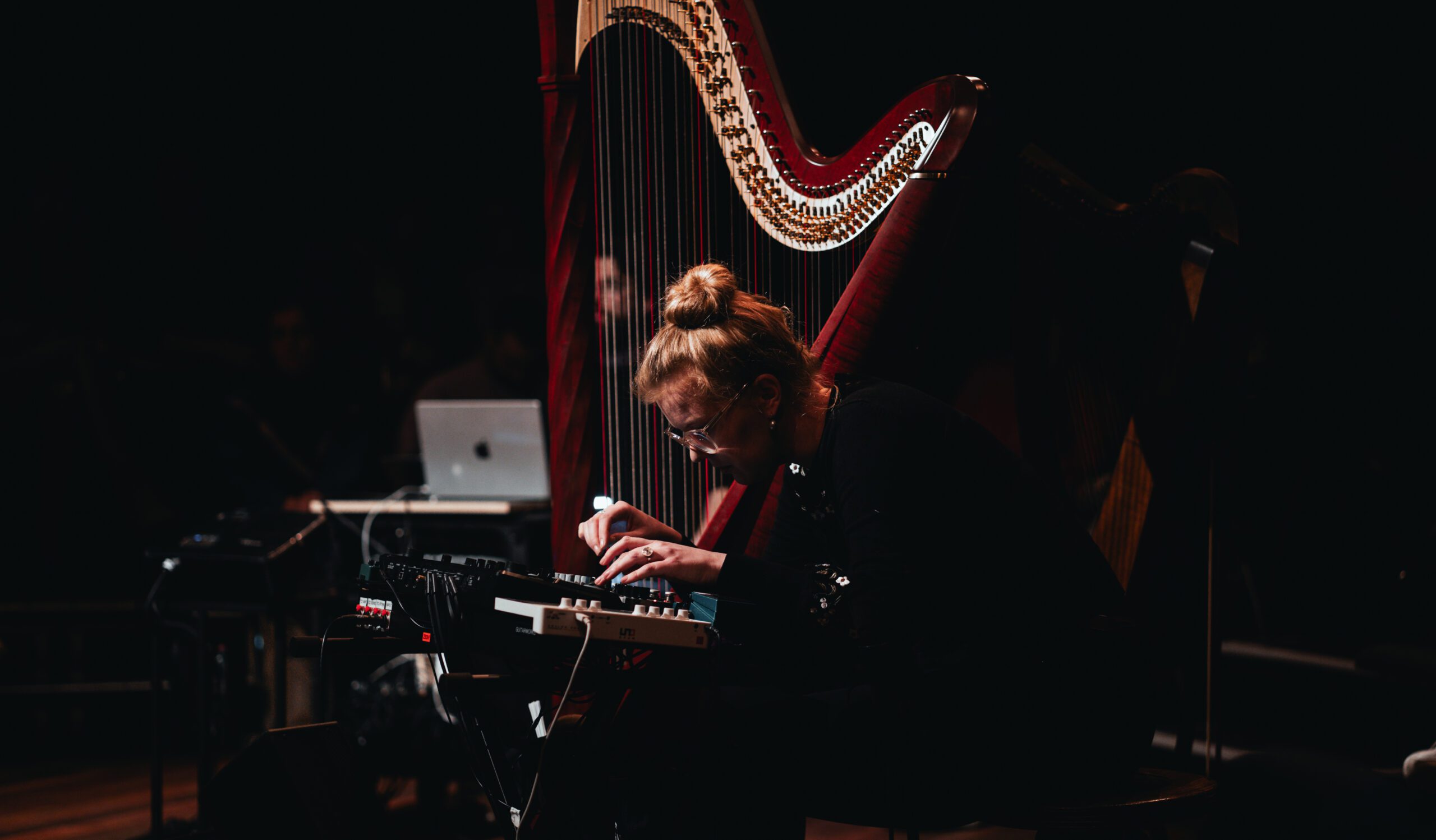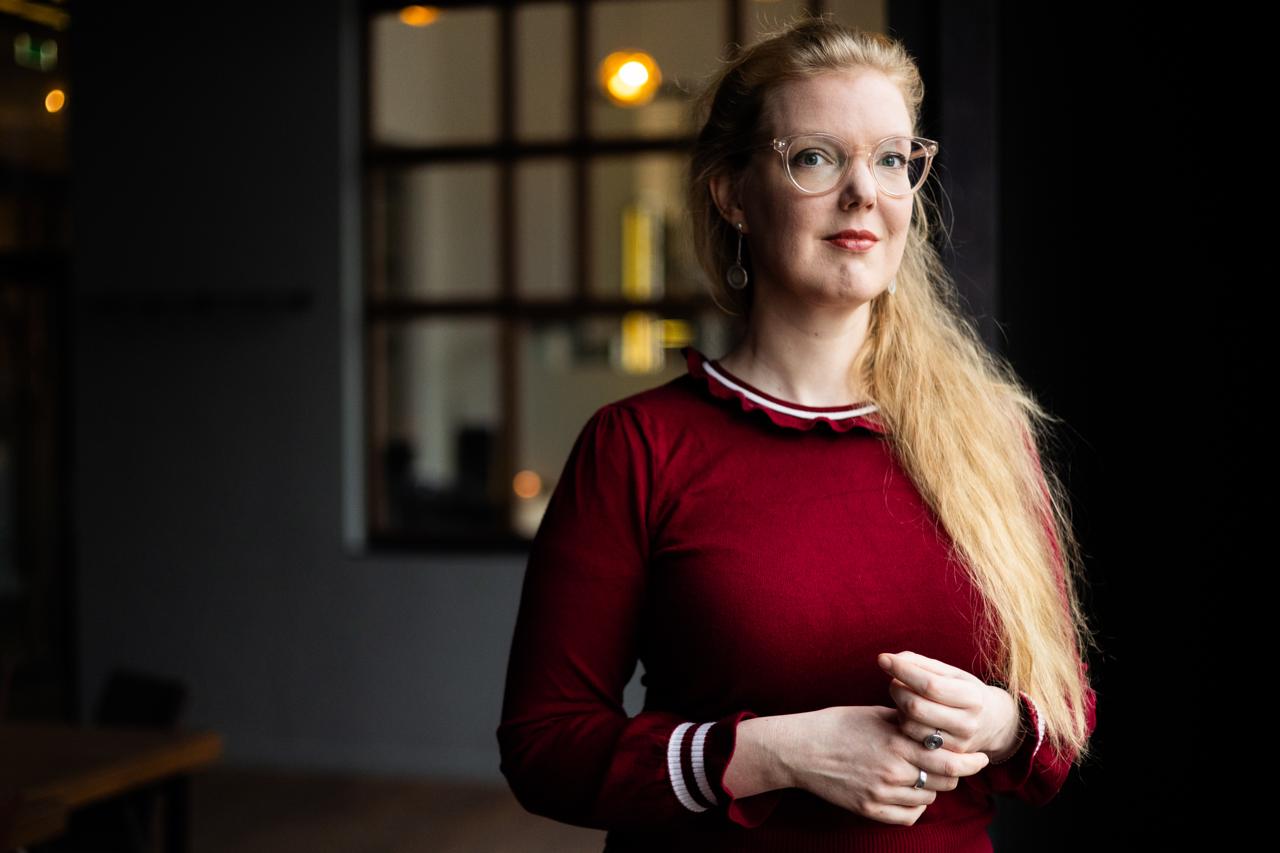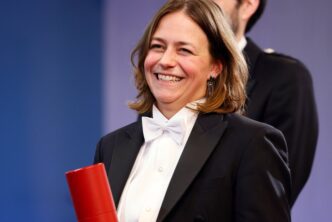On the evening of Monday 10 March, you can immerse yourself in the For Real ‘theatrical radio show’ at TU Delft. The performance’s starting point is the intellectual undermining of women, explains Andrea Voets, harpist and the conceiver of the show. “People say that they see it as a hopeful show, but for me it is very dark.”
Andrea Voets: “I see intellectual undermining – sexism in thinking – a lot more painful."(Photo: Koosje Koolbergen)
When Andrea Voets (35), the harpist and ‘music journalist’, sits down, she starts a barrage of questions. “What did you study and where do you work now?” she wants to know. “Delta. Hmmm … were there not a lot of issues at TU Delft?” she asks, thinking. “I heard something about on the Argos radio show.” This – the interviewee asking the first questions – typifies Voets. She is always on the lookout for the stories of others, for the one anecdote that can stay around for years and that may later appear in her work.
One example is the Italian age peer who stormed away from a party in anger after a clichéd joke about the Mafia. “When I asked what happened, he told me that he lived close to the motorway where the Mafia boss Giovanni Falcone was blown up.” This was the start of her Millennial History (in Dutch) podcast in which she interviewed 10 millennials between 2018 and 2021 who had undergone important events in European history.
Previously, Voets had created the classic While We Live theatre piece about loneliness and which the NRC newspaper placed in the list (in Dutch) of Best Classical Music of 2020. She also played in Xenitia, a documentary concert about Greeks who moved abroad because of the economic crisis that paralysed their country.
Intellectual undermining
And now she has come to TU Delft with For Real. The performance is about what Voets calls ‘intellectual undermining’. Fourteen women from different generations and countries talk about the lack of recognition for their thinking, work and deeds because of their gender.
The most important source of inspiration for For Real was not an anecdote about someone, but the book entitled The Authority Gap: Why Women Are Still Taken Less Seriously Than Men, and What We Can Do About It by British journalist Mary Ann Sieghart. Through sociological research it shows how women are systematically taken less seriously than men.

Sieghart writes about the author Catherine Nichols who sent her manuscript to about 50 literary agents and after three months only got two positive reactions. When she sent the manuscript with a male pseudonym, George, she received 17 positive responses almost immediately from a similar number of submissions. “When I read that I knew that I wanted to create a theatre piece about it,” says Voets.
‘I am very curious to see how it will be received at TU Delft’
And so she collected 60 hours of interviews and compiled them into about 40 minutes. Voets believes that sexism is often expressed in lower salaries or being judged on your appearance. “I see intellectual undermining – sexism in thinking – a lot more painful. If you take Nichols as an example, you see that she not only gets a lot fewer positive responses because she is a woman, but she also has to wait a lot longer for those responses. So her career is literally slowed down.”
Trust in others
Voets was invited to TU Delft by DEWIS, the women’s network, in honour of International Women’s Day. She is “very curious to see how For Real will be received at TU Delft”. She is very interested in the sciences in terms of intellectual undermining. “You would think that women would be taken seriously as a mathematical comparison either works or does not work, and an experiment is either successful or not. Yet there are countless scandals and investigations into the position of women in these areas that show the opposite. How is this possible? Really, how? I want to understand it.”
Recent examples of intellectual undermining at TU Delft include the resignation of Daphne Stam, a leading planetary scientist, and the anti-acknowledgements that were much shared on LinkedIn by Biophysicist Rachel Los who recently got her doctorate. In her dissertation she added a paragraph under her acknowledgements saying how she was undermined from her very first year as a student because of her gender and how this affected her self-image. When Voets sees the text, she says “Very good and cleverly written. I would like to invite her, or in any case write about it. Wow.”
Recommended reads
Theatrical radio show
In For Real, Voets interchanges fragments that were recorded beforehand and answers from the public to questions such as ‘when have you felt invisible?’. The harpist improvises on the spot with Sarah Jeffery on the recorder and George Dumitriu on the viola and guitar. Live music, bits of interviews, the audience’s response are the reasons that Voets calls this a ‘theatrical radio show’. Voets says that anyone allergic to audience participation needs not worry. “I am too. But now I have to do it. It would be hard to do a performance about intellectual undermining without asking the people around you about their experiences.”
Watch the trailer of For Real here.
In the performance’s scenes, the interviewees talk about how intellectual undermining affected their self-esteem, relationships and trust in others. For her, the performance is mostly about human values. “It’s not only women who experience intellectual undermining, it can also happen if you have certain skin colours or accents. And it destroys so much. It is hard to build meaningful relationships if others are not interested in what you think. You start doubting your own abilities and potential if people do not believe that you are good at what you do.”
‘I hope to turn on people’s moral compass’
For Real has been around for more than a year. “Visitors say that they see it as a hopeful performance, but for me it is dark. The subject brings up frustrations in me about unnecessary injustices from not being heard and seen. This negatively affects everyone.”
In answer to the obvious question of what Voets hopes to achieve with her performance, she thinks for a while. “I need to choose my words carefully as I do not want to steer people in their experiences,” she explains. “In the end I hope to turn on people’s moral compass. That they start looking at the world slightly differently and start acting slightly differently. What that acting involves is up to them.”
Voets herself has adapted her own behaviour since For Real. “You often hear women saying that they have to contain themselves and not come across as angry. I have started self-censoring less. I think and act fast. Before, I was afraid that people would think me too intense so I started talking more slowly more often than was needed. I now let people adjust to my speed.”
- The full DEWIS event starts at 16:30 and ends at 21:00 and starts with a networking dinner. For Real is from 18:15 to 20:30. Location: TU Delft Aula (foyer and auditorium). Sign up here.
- Every performance of For Real is recorded as a podcast episode. The episodes are available here (in Dutch).
Andrea Voets (1989) grew up in a Dutch family in Belgium and studied at the conservatories in Amsterdam and Berlin. She is the Artistic Director of Resonate Productions, for which she combines original compositions and in-depth research to create ‘musical journalism’. In 2022 she received the coveted Fastforward subsidy from the Fonds Podiumkunsten that only two artists receive every year. A multi-year subsidy (2025-2028) enables her to work on several projects, including the production of Nothing Bigger Than Humanity that will be premiered in May 2025. For this piece she interviewed a researcher of the illegal ‘black’ children that were born during China’s one child policy era.
Do you have a question or comment about this article?
a.m.debruijn@tudelft.nl



Comments are closed.